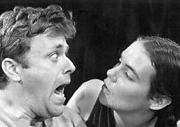THE SECRET OF ALL good comedy is timing, and that includes the frequent use of a stopwatch. One minute extra to an otherwise humorous skit, and your typical audience suddenly wishes it was someplace else entirely.
Summer Durang . . . Some Are Not
Northwest Actors Studio, ends Aug 26
So you’d think they’d be doing playwright Christopher Durang a favor by mounting a collection of his shortest pieces in Summer Durang . . . Some Are Not, topped off in the second half with his popular one-act The Actor’s Nightmare. In the event, there are certainly some tasty snacks on the hors d’oeuvres tray, though they don’t include the sitcom-ish D.M.V. Tyrant (surprise! A mean person at the Motor Vehicles office!) or the one-joke The Hardy Boys and the Mystery of Where Babies Comes From (you’ve just read the joke). But the Funeral Parlor is a farcical yet surprisingly tender look at middle-class mourning; and a very funny parody of Medea includes a Greek chorus that frequently speaks in titles of self-help books (“Men are from Mars, Women are from Venus,” they advise the raving wife after her husband’s desertion).
Director Anthony Curry’s clever way of tying together this series of short pieces is to include the playwright himself (capably impersonated by Andrew Neel) as a character, so that he features in the first piece Business Lunch at the Russian Tea Room (where he’s wooed by an aggressive Hollywood producer to make a movie about a love affair between a rabbi and a Catholic priest) and additionally acts as an onstage narrator. For the rest of the evening’s first half, Neel, dressed in flannel pajamas and with his hair excessively rumpled, appears in cameo roles and informally chats (as Durang) about his obsessions with the Catholic church, guilt, nuns, and death.
But having given us a bemused man in his PJs, Curry then makes a grievous error in removing his clothes altogether for what should be the highlight of the evening, The Actor’s Nightmare. Used for effect, a naked man is of course very funny, but watching poor Neel do most of this piece disrobed is not only embarrassing, but entirely extraneous to Durang’s text. Even without this curious decision, the cast misses out on the central fact that for better or worse, this is a parody of several other plays. (The play switches from Noel Coward to Hamlet to Samuel Beckett, with our poor protagonist not knowing the lines to any of them.) But the actors don’t really manage a hit in any of the styles, and each must instead make do with his or her own comic resources.








